Showcase Magazine, Ephemera, C & R Press, Steel Toe Books, Fjords Review, PANK Magazine, American Poetry Journal...oh my?
Into the rabbit hole we go...
Welcome to our weekend conversation—special early edition!
Many of you will recall that not too long ago I questioned the goings-on at PANK Magazine. The journal had my submission for nearly two years with no response and had charged a $5 “tip jar” reading fee. When I spoke publicly about this, it turned out many other writers had similar experiences. What’s more, books that people had ordered from PANK never arrived, authors’ own books had not been delivered, and several editors quit under what they described as conditions of utter mismanagement.
PANK apologized on Twitter, but did not lay out any specific plans. Shortly after, they sent out a mass email inviting contest submissions. At present, the journal remains open for contest entries and “tip jar submissions” of $5.
Well, this past week, I was contacted by a source (who wishes to remain anonymous). The source shared with me pages of documents, websites, testimonials from writers and social media posts, all of which put PANK Magazine into a larger and important context. I spent the week investigating, and can confirm that my source’s information checks out. I will now do my best to share these insights with you.
*
Let’s begin where my source began, which is by taking a look at Showcase Magazine. This is a new magazine that “aims to bring top flight, creative, voice and style-centered contemporary writing to new readers…” The magazine operates as a Substack, which is part of an interesting new wave of Substack-based lit mags.
A look at the journal’s guidelines, though, raises some questions. According to Showcase’s submission guidelines, “Everyone gets 1 free submissions [sic] per issue and any additional pieces we ask if you'd consider helping the magazine with a reading fee.”
Okay, fair enough. When you get past that bothersome typo, it seems that every writer can submit once for free but has to pay after that. Sounds reasonable. However, when you attempt to submit your work, there is no free option. The only option is to submit with the reading fee. The fee is $10 per manuscript.
Well, fine. The missing free option could be a simple error. Someone on Twitter told me that she has submitted to Showcase for free. She posited the possibility that there is a cap on submissions and the editor just needed to update their guidelines.
Try looking for a masthead here, though, and you will find that there is no one to contact about the conflicting guidelines. There is no editor name in sight. I left a comment on one post, asking who the editors are.
As of this writing, no one has replied to my inquiry.
Alrighty, so this is a new magazine that may not have found its footing yet. What’s the big deal?
Well, Showcase is linked to the newsletter Ephemera. How can we tell? Because when the owner of Showcase likes someone’s comment, it says “liked by Ephemera.” The notice is in orange, which is how Substack lets you know that the person who liked the comment is the site’s author/owner.
There is also this: When you visit the CLMP directory to try to locate the editor of Showcase, the editor’s email is Ephemera.newsletter@gmail.com.
Okay, then. So we have two literary Substacks linked to one another. One is new and has confusing guidelines. Neither have mastheads. Who cares?
It turns out the Editor of Showcase, according to the CLMP directory, is a person named Andrew Ibis.
Here is where things start to get odd. If anyone should know how to run a press or magazine, it is this individual. In addition to Showcase being registered under his name, Ibis is the Publisher & Editorial Director of C& R PRess, Publisher of Steel Toe Books, has published writing in numerous literary magazines and much more.
According to his LinkedIn bio: “I run three publishing houses and several independent literature, arts, and culture magazines with the goal of bringing literature back into the main stream [sic].”
Impressive! (Aside from yet another bothersome typo).
But not so fast. That LinkedIn bio is for someone named Andrew H.S.
Who is Andrew H.S.? Well, most likely Andrew H.S. is Andrew Sullivan.
Who is Andrew Sullivan? According to Poets and Writers, Andrew Sullivan is the Director of C & R Press.
Hold on. On the C & R Press site, it says Andrew Ibis is the Director of the press.
Right. It appears this person uses different names at different times–Ibis, Sullivan, or H.S..
Kind of confusing, but certainly not an offense. But then there is this:
Say what? A scam?
The “Victoria” to whom “A” is referring to here is Victoria Strauss, Creator of Writer Beware. On this site, “A” left the following comment: “The real Andrew Ibis at C&R Press is also a legit scammer. His real name is Andrew Sullivan and he’s a con artist in the publishing world.”
A “scammer”? A “con artist”?
These are serious claims, which should always give us pause. One would certainly want to reach out to the publisher of C & R Press in order to give him an opportunity to respond.
I tried to do just that.
Yet, as with Showcase, C & R Press offers no email address for anyone who works there. The Contact page takes you here:
Nor is there any contact information at Steel Toe Books, where Ibis is also on the masthead as Publisher.
The Facebook page for Steel Toe Books does provide a contact email. Weirdly, though, when I ran that email through a verification site, this came up:
The same thing happens with the email address listed on the Poets and Writers database.
Meanwhile, Authors Publish has C & R Press on its Shame List for publishers who always charge fees to submit manuscripts. Emily Harstone writes,
This press publishes novels, poetry, short story collections, creative non-fiction, memoir, experimental and hybrid work. They charge 25$ for their open reading period, 20$ for their chapbook competition, and 10$ to submit to an anthology they are putting together, one that already has solicited submissions.
Harstone’s post actually appears to be out of date. As of today, submissions to C & R Press cost up to $30. (Steel Toe Books also charges. It’s $25 for both contest and regular book submissions.)
Then there is this comment on Absolute Write about C& R Press:
$25 reading fee?
I'd have gladly thrown away only $25 to these crooks.
I paid close to a $1000 to have this company/org/whatever read my work for nothing. How, you ask?
At least one of the editors/owners at this publisher is on Upwork [editor-matching website] offering his editorial services. In his profile and in private conversation he states he has also acted as an agent to previous clients whose work he's edited, and has placed the books at major and indie publishers like S&S, Ballantine, Red Hen, etc.
So I thought, what do I have to lose? So what if he claims to be not just a publisher but a freelance editor and agent? And plus if he liked my work, he could help land me a book deal.
He did a shit job editing my work…He actually made my work much worse, as a later editor who looked over his notes found.
He then wanted to meet up with me to discuss becoming my agent, which is where his real intentions became clear. He didn't want to be my agent at all. He wanted to publish it on C&R. When I said no, I want it on a major publisher, he said he wanted 20% and exclusive rights to shop the book for a year.
During our conversation he asked me questions like…"what happened in the end of your book again?"
And it was then that I realized how I'd been conned. He likely passed off my manuscript to one of his publishing house's interns to read, probably for free or little pay, and collected the $1000. This is this publisher's business model, folks.
…[B]efore I cut him loose I made sure to contact the authors whose books he claimed he sold and publishers he claims he sold them to. I asked them all: who was the agent for this book? He never sold these books…
Without knowing the full scope of the situation, we ought not jump to conclusions. How do we know this person is telling the truth?
The commenter adds in a second note, “I'm more than happy to provide any watchdog group or regulatory body private emails and other communications where it can be shown which titles this person claimed he sold to publishers.”
Still, no one is named here, other than “one of the editors/owners at this publisher.” How do we know who the commenter is talking about?
At The Writer, A. H. Sullivan’s bio reads,
I’m the managing editor at a major literary magazine, Fjords Review, in 1200 bookstores across 5 countries. I’m an uncredited consulting editor at numerous other journals (Pank, Carbon Culture, Quiet Lunch). I’m also the director of a midsize independent publishing house that puts out 20 books a year. I go to all major book fairs and writing conferences and have 50+ authors who I develop and edit at the press. I also freelance agent and have sold titles recently to Random House and Simon and Schuster and Red Hen Press. I wear many hats and have my hand in every aspect of the business. This, I think, gives me a unique point of reference with regard to mentoring other writers.
Sounds like a lot of work! It also sounds like the person described above.
Still, we need more than a few anecdotes. How do we know this isn’t just one vengeful writer lashing out? Or, if something nefarious did take place, maybe it was just some weird one-off thing?
Let’s turn to Fjords Review, mentioned in his bio (and where he is on the masthead as Andrew Ibis).
What are people saying about Fjords Review?
“Awful, unresponsive and unprofessional”? Accepted work then ghosted the writer?
These are more strong claims. Surely we would want to perform due diligence and reach out to the editors to hear their version of events.
Except, the email address on the Fjords Review site appears to be inactive.
I tested it myself. My email also bounced back.
At the email verification site, I again got this message:
Okay, but if you visit the Fjords Review site (where you will find two advertisements for Showcase Magazine) you will learn that the bio from The Writer is out of date. Andrew Ibis is named as Editor-at-Large Emeritus. He is no longer there.
The current Publisher and Editor-in-Chief of Fjords Review is John Gosslee.
Who is John Gosslee? According to his website, Gosslee “purchased and brought continued diversity to C&R Press in 2013.”
From what I gather, it appears that Ibis left Fjords and is now at C &R Press. Gosslee left C & R Press and is now at Fjords. Funny.
Less funny is what others have said about Fjords Review (which also charges $5 per submission). Fjords, like PANK and C & R Press, has been accused of several questionable practices.
In this case, these practices include not announcing contest winners:
And directing writers whose work has been rejected to editing services run by other editors on their staff:
Yikes.
But again, there could be reasonable explanations for all of this. Running magazines and presses is hard work, not to mention running two or three or four at once! Mistakes are bound to be made.
Let’s keep digging. What else is in Gosslee’s bio? “[Gosslee] owned and managed PANK from 2015-2019.”
This brings us back to PANK. But Gosslee is no longer on the masthead. Someone named Jessica Fischoff is the current Editor of PANK.
Fischoff is also the owner of American Poetry Journal. Surely people have nice things to say about this magazine, right?
Like Showcase, C & R Press, PANK and Fjords Review, American Poetry Journal charges for submissions ($5). They also charge $15 for chapbook submissions and $25 for book award submissions.
Like Showcase and C & R Press, American Poetry Journal has no contact information on their website. (The editors’ names do link to their personal sites, where there is contact information. I did not verify it.)
But surely this is all a coincidence, right? We have a bunch of editors accused of similar-sounding practices. Yet how closely do these editors even know one another?
Ibis /Sullivan and Gosslee overlapped at a few places. But it’s not like they’re all in frequent contact or any of them might have some sort of intimate relationships, right?
It’s not like they might appear to leave one venue while still maintaining financial ties to that venue, right?
In fact, Jessica Fischoff is John Gosslee’s wife.
*
Now, here is a question. Why has no one written about any of this before?
We have multiple magazines and publishing houses run by the same handful of people, all with repeated accusations of mistreating writers and taking money for undelivered products and services. We have multiple publishing entities with no mastheads or no contact information. There are accusations of fake identities being used to scam writers. There are accusations of attempts to scam writers into signing up for editorial services. There are editors quitting under intolerable working conditions. There are writers withdrawing work after being ghosted by editors. There are false email addresses and name changes.
This information is all publicly available. Yet these outfits are still listed on reputable directories. The editors continue to launch new ventures. Up until this week, I myself was not aware of many of these concerns.
Why is this not front and center of our literary conversation?
Perhaps, the answer to this question might be found in this writer’s tweet.
They couldn’t help her, she claims, because Gosslee is co-owner of LitBreaker.
For the record, someone affiliated with The Rumpus denied that the connection to LitBreaker was the reason for turning away the piece, citing legal concerns instead. That’s plausible. What cannot be denied, however, is the tremendous reach of LitBreaker.
LitBreaker is an ad network that allows literary organizations to earn passive income by running ads for other literary organizations on their sites. I used LitBreaker back when I was running my site, The Review Review. The ads were writer-friendly, ran as a banner on the top or on the side of the screen, and advertised things like publishing houses and MFA programs. If you’ve visited any literary site, you’ve likely seen ads placed by LitBreaker.
It’s a brilliant conception, as it saves editors and publishers the hassle of having to solicit advertisers, and supports books and literary institutions both by bringing income to the sites hosting the ads and income to those who are being advertised.
When I was using LitBreaker, in a good month I could make about $100 just for doing nothing and running the ads on my site. A more popular website could probably make a few times that, at least.
And LitBreaker certainly does business with some very popular websites. These are the entities where LitBreaker runs advertisements, and thus provides a passive stream of reliable and not-insignificant revenue:
Academy of American Poets – An Unconventional Librarian – Awful Library Books – Bad Bird Reads – Batch of Books – Behind the Pages – Bella’s Bookshelves – Black Heart Magazine – Book Chic Club – Book Lover Book Reviews – BookPage – Books Speak Volumes – Books Without Any Pictures – Boulevard Magazine – Broken Pencil – Carve Magazine – Chapter By Chapter – Chick Lit Plus – Cleaver Magazine – Confessions of a Book Addict – Conversational Reading – Critical Theory – Empty Mirror – Entropy – Epiphany – Feed Your Fiction Addiction – Fiction Advocate – Fiction Writers Review – Finding Wonderland – Fjord’s Review – Full Stop – Gemini Magazine – Granta Magazine – Guernica Magazine – Guiltless Reading – Happy Indulgence Books – Harper’s Magazine – Hypertext Magazine – Jewish Currents – Joyland Magazine – Kritters Ramblings – Largehearted Boy – Litbreak – Literary Kicks – Literary R&R – Litreactor – Luxury Reading – Manda-Rae Reads a Lot – Michael SciFan – Monkey Bicycle – Mookse and Gripes – Mostly YA Lit – Mother/Gamer/Writer – Mrs Mommy Book Nerd – Narrative Magazine – Omnimystery News – Open Letters Monthly – PANK – ParchmentGirl – Peace Love Books – Platypire Reviews – Poets & Writers – Propeller Magazine – Quarterly Conversation – Rabid Reads – Ramblings From This Chick – Rare Books Digest – Reading On A Rainy Day – Read it Forward – Real Pants – River City Reading – Run Spot Run – Sarah’s Book Shelves – Sassy Peach Book Blogger – Savvy Verse & Wit – Sophisticated Dorkiness – Storeybook Reviews – The Cardiff Review – The Compulsive Reader – The Discriminating Fangirl – The Electric Typewriter – The Gilmore Guide to Books – The Great Gray Bridge – The Lit Bitch – The London Magazine – The Millions – The Mod Podge Bookshelf – The Nervous Breakdown – The Paris Review – The Pen & Muse – The Quivering Pen – The Reading Date – The Reading Frenzy – The Review Review – The Rumpus – The Things You Can Read – The Tusk – The Weeklings – Three Guys One Book – Tif Talks Books – True Story Book Blog – Underground Book Reviews – Vinobaby’s Voice – Vintage Novels – Vol.1 Brooklyn – Warscapes – West Metro Mommy Reads – Winning Writers – Words For Worms
When I worked with LitBreaker, I worked with its original Founder & CEO, Jason Chambers. But Jason is no longer there.
The new owners do not list their names anywhere on LitBreaker’s site, a pattern you will no doubt find familiar by now. On LitBreaker’s Facebook page, however, Chambers shared important news in 2018:
Dear Friends of Litbreaker,
I’m pleased to introduce you to John Gosslee and Andrew Sullivan, who are the new owners of Litbreaker! John and Andrew are the directors and publishers of Fjords Review and C&R Press, amongst other literary projects, and they are long time strong energetic contributors to the community. I’m thrilled that Litbreaker will continue under their leadership and I am confident that their hard work and passion in supporting literary pursuits will be realized in benefits to Litbreaker’s affiliates and advertisers.
*
Are all the entities named above complicit in some kind of concerted scheme being orchestrated by a few powerful and well-connected individuals? No. Of course not. At The Review Review back in the day, I hosted ads for both C & R Press and Fjords Review. If no one is talking about any of this, how could anyone have any idea what is going on?
And what is “this” exactly? Is there truly such a scheme taking place?
What really is going on?
The only way to find out is to start asking questions. Which is just what I have come here to do.
What do you think?







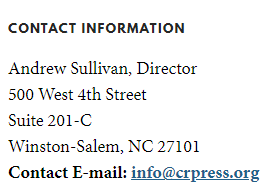






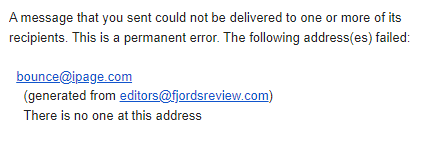


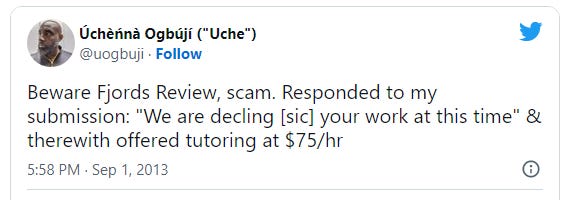


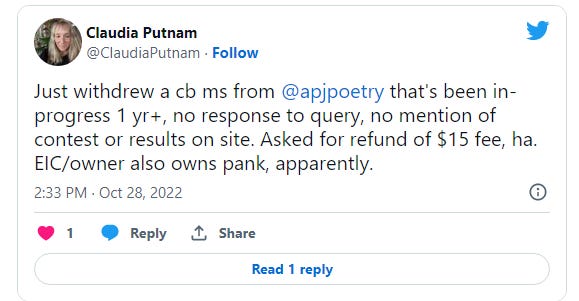

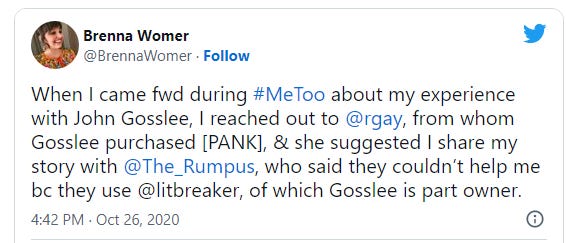

Great work, Becky! Too late for this year but this really should be an AWP panel.
Thank you for this excellent article! I knew some of this, and some of it was new to me.
I will say, having published it, that the Authors Publish Shame list article is from 2018 (we are working on re-adding publication dates to the website), and we haven't updated the article, because of the amount of hate mail we received because of it, including threatened legal action that never came (and death threats - oh joy!). We haven't removed it either, because even though small details have changed, the majority of the article remains true, and we still know of authors who have benefited from it. That said, after I updated that version of the Shame List, I received a lot of thoughtful feedback from authors who had submitted to C&R and had waited years for their submissions to be opened. Some had frequently petitioned the editors and still hadn't received any response. Many had simply given up, one after almost 5 years of waiting.